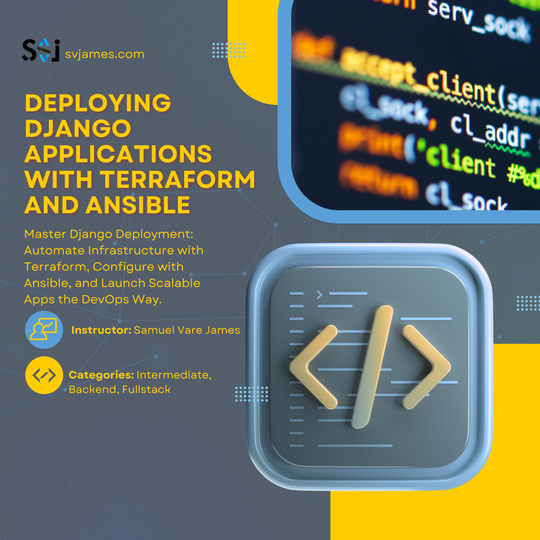
Deploying Django Applications with Terraform and Ansible
This course teaches you how to deploy Django applications using modern Infrastructure as Code (IaC) tools, Terraform for infrastructure provisioning and Ansible for configuration management. You'll start with an existing Django REST API project and walk through the full deployment pipeline: setting up servers, automating app deployment with Docker, securing your environment, and monitoring production systems.
By combining hands-on projects with best practices, this course prepares you to deploy and manage scalable Django applications with professional DevOps tooling and workflows.
Instructor: Samuel James
Categories: DevOps, Fullstack, Intermediate
Course Duration: 215 mins
Course Summary
Course Overview + Learning Outcomes
Deploying Django Applications with Terraform and Ansible is a hands-on, project-based course that teaches modern DevOps practices for backend developers. You'll take a production-ready Django REST API and automate its deployment using Infrastructure as Code (IaC) with two industry-standard tools:
- Terraform for provisioning servers and network infrastructure.
- Ansible for configuring environments and deploying applications.
From setting up cloud infrastructure to securing it with SSL and automating full deployment workflows, this course equips you with practical DevOps skills that go beyond traditional web development.
By the End of This Course, You Will:
- Understand the benefits and principles of Infrastructure as Code (IaC).
- Use Terraform to provision servers, manage SSH keys, and handle state.
- Use Ansible to install Docker, manage users, and deploy Django apps.
- Combine Terraform and Ansible for a fully automated deployment pipeline.
- Secure your app with SSL certificates and firewall rules.
- Add monitoring and logging for production reliability.
- Confidently deploy updates, manage resources, and follow DevOps best practices.
🧰 Tech Stack Used in This Course
Programming Language
Python 3.x
Web Framework
Django REST Framework
Infrastructure Provisioning
Terraform
Configuration Management
Ansible
Containerization
Docker, Docker Compose
Web Server
Gunicorn
SSL & Security
Let’s Encrypt
Cloud Platform
DigitalOcean
Monitoring & Logging
logging via Docker
Secrets Management
Environment variables via .env, ansible-vault
Automation Pipeline
Integrated Terraform + Ansible workflow
Course Units
Prepare the Django REST API for deployment. Explore the project structure, containerize the app using Docker and Docker Compose, and configure environment variables for production readiness.
You need to purchase this course to watch the videos.
Automate server configuration with Ansible. Create playbooks to install Docker, configure users and permissions, and deploy your Django app inside Docker containers.
You need to purchase this course to watch the videos.
Use Terraform to provision cloud infrastructure. Write scripts to spin up droplets on DigitalOcean, manage SSH keys, networking, and understand how Terraform state keeps your infrastructure in sync.
You need to purchase this course to watch the videos.
Combine Terraform and Ansible into a seamless deployment pipeline. Utilize dynamic inventory, automate full deployments, and verify that your app is live and running.
You need to purchase this course to watch the videos.
Take your Django app to production-ready standards by securing it with HTTPS and a custom domain. In this capstone project, you’ll connect a domain to your DigitalOcean droplet, configure NGINX as a reverse proxy, and use Certbot with Let’s Encrypt to issue and renew SSL certificates. You'll also integrate these steps into your Ansible workflow, automate SSL setup, and verify that your API is securely accessible over the internet.
By the end of this project, you’ll have deployed a secure, fully Dockerized Django API, accessible via a trusted custom domain, equipped with real-world DevOps practices like DNS management, automated certificate renewal, and infrastructure-as-code automation.
You need to purchase this course to watch the videos.